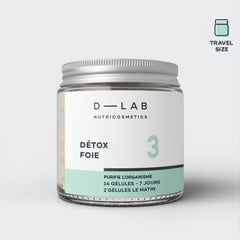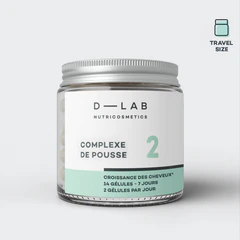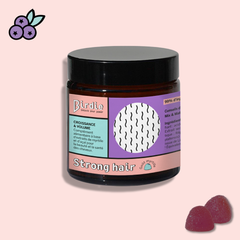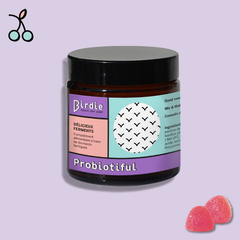
Pigmentation spots, also known as brown spots, affect around 80% of women, whatever their skin type and age.
Pigment spots usually appear on the face, neck, décolleté and hands.
Most of the time, this hyperpigmentation is totally benign, but for aesthetic reasons many of us want to see it disappear.
Thanks to dietary supplements, it's possible to prevent and reduce these pigmentation spots naturally and regain an even, radiant complexion!
I. What is a pigment spot?
Age spots are the result of hyperpigmentation, characterized by uneven pigmentation of the skin. It's a common skin condition caused by an overproduction of melanin by our cells, called melanocytes.
Melaninis the natural pigment that colors our skin, hair and body hair. It acts as a natural sunscreen, protecting our skin from harmful UV rays. Brown age spots are more common on fair skins, and are generally located on the areas most exposed to the sun: face, décolleté, back of hands.
The mechanism of melanogenesis (melanin synthesis) is based on a succession of biochemical reactions. Melanin is produced from an amino acid: tyrosine. Tyrosine and its by-products are oxidized by various enzymes, including tyrosinase, which controls the first stages of the mechanism. Melanin accumulates within cells, right up to the epidermal surface.
The greater this activity, the greater the amount of melanin produced and the darker the skin. Many factors can lead to an increase in the amount of melanin produced by the skin.
II. What causes pigmentation spots?
Hyperpigmentation is a physiological mechanism that can occur as a result of various factors.
Depending on the phenotype, i.e. skin tone and color, brown spots can be darker or lighter.
For example, since black, dark and mixed-race skin is naturally more pigmented and more concentrated in melanin than white Caucasian or Asian skin, dark spots tend to be darker and take longer to fade. What factors cause dark spots?

Overexposure to the sun:
In case of too much exposure to the sun, melanocytes produce melanin in an uncontrolled way. It accumulates in the form of small localized clusters and leads to the appearance of brown spots, particularly on fair skin on the face, neckline and hands.
Acne and irritative skin dermatitis:
Following local skin inflammation such as acne, eczema or psoriasis, excessive melanin production can occur during the healing process.
Dark pigmentation spots called post-inflammatory hyperpigmentation can then appear on the skin. These pigmentation spots generally fade with time, but are more frequent, more visible and take longer to disappear on dark and black skins, which are very rich in melanin. If the pimple has been rubbed, scraped or squeezed, the stain is likely to be more pronounced, larger and take longer to disappear.
Small wounds, cuts, burns:
During the wound healing process, melanin production naturally increases. The regenerated skin cells are darker and temporarily discolored.
Cosmetic procedures (chemical peels, dermabrasion, laser treatment):
Post-inflammatory hyperpigmentation and blotches can occur after aggressive cosmetic skin procedures and during the healing process.
Skin aging :
With age, the number of melanin-producing cells decreases, but the size of the remaining cells increases. This results in uneven pigmentation of the skin.
This natural physiological phenomenon accelerates around the age of 40, hence the increase in the number of age spots.
Hormonal variations :
Female hormones, including estrogen and progesterone, cause an overproduction of melanin, especially when the skin is exposed to the sun.
Hormonal variations upset the hormonal balance and the skin's ability to regenerate.
In pregnant women, it is common to see areas of hyperpigmentation on the face, known as melasma or "pregnancy mask". Outside of pregnancy, hyperpigmentation can also occur in women taking hormonal contraceptives, but also during menopause.
III. How can pigmentation spots be prevented and treated naturally with food supplements?

Remember that you should never try to whiten a spot or your skin, but only to lighten it and even out your complexion. Prolonged use of depigmenting and whitening treatments can cause serious damage that is difficult to treat, such as brown spots, white spots and uneven skin tone.
Even once pigmentation spots have set in, they can be effectively faded naturally thanks to dietary supplements.
Composed of vitamins, minerals, trace elements and plant extracts, dietary supplements act directly at the heart of cells to slow down the hyperpigmentation process that causes brown spots. Thanks to targeted active ingredients, they help reduce dark spots and brighten the complexion naturally.
At D-LAB, we have developed dietary supplements that target the main causes of pigmentation spots: skin inflammation, melanogenesis and oxidative stress .
- The Glowing Skin Complex contains 7 natural and innovative active ingredients, which unify and revive the complexion, preserve the tissues from skin aging and reduce brown spots.
- The Baby Skin Duo is designed for sensitive and reactive skin. The Luminous Skin Complex helps to reduce pigmentation spots and revive the radiance of the complexion, while the Soothed Skin Complex reduces skin inflammation and protects the skin from external aggressions.
- The Total Radiance Duo combines a tanning, protective and soothing action to enjoy the benefits of the sun while protecting against harmful UV rays. The Active Sun Complex naturally stimulates and accelerates tanning, while the Soothed Skin Complex protects the skin from photoaging and prevents the appearance of brown spots.
With dietary supplements, it is possible to act simultaneously on several biological levers in order to obtain visible and lasting results.
A soothing anti-inflammatory action to calm the mechanisms of inflammation, often at the origin of the first tasks.
Post-inflammatory hyperpigmentation is a type of skin hyperpigmentation that is mainly triggered by the way the skin regenerates after inflammation when an area of the skin is weakened and attacked,
Soothed Skin Complex contains highly-dosed, bioavailable active ingredients with anti-inflammatory properties.
- Roman chamomile flower extract, 4 times more concentrated in active ingredients than the dry plant, reduces redness and soothes itching sensations.
- Turmeric, a natural anti-inflammatory and powerful antioxidant, relieves skin inflammation and redness.
- Oil of chanvre 's anti-inflammatory properties are renowned for calming redness and soothing the skin.
- The SOD also helps to protect the skin from inflammation by acting at the heart of the cells. From melon of Provence, is known to protect the skin from external aggressions, in particular UV. A patented primary antioxidant, it is 37 times more concentrated than pure melon.
An action on melanogenesis, the mechanism responsible for skin pigmentation.
It is possible to reduce the appearance of pigmentation spots by controlling melanogenesis, the mechanism responsible for producing the melanin that causes hyperpigmentation.
Luminous Skin Complex contains an innovative concentrate ofOPC from Landes maritime pinean active ingredient certified by numerous clinical studies for its action on the radiance and uniformity of the complexion and its antioxidant properties. Studies conducted in recent years indicate that OPCs (Oligo-ProCyanides) are capable of inhibiting inflammatory reactions and pigmentary disorders.
An action on the microcirculation to promote oxygenation and the elimination of toxins.
To ensure the best possible nutrition for the skin, it is essential to stimulate skin microcirculation. Improving circulation also allows for better assimilation of active ingredients, especially those that regulate melanogenesis.
- Luminous Skin Complex contains camu-camu extract, titrated in native vitamin C, recognized for promoting microcirculation and skin radiance.
- Soothed Skin Complex contains an extract of Centella Asiatica 10 times more concentrated than the dry plant, reputed to improve healing and promote skin regeneration.
An antioxidant action that protects cells from harmful free radicals that maintain hyperpigmentation.
Our sun exposure excessive exposure to UV rays can lead to premature tissue ageing. In fact, oxidative stress can result from the harmful effects of the sun. Weakened cells can lead to the formation of new pigmentation spots or the intensification of existing ones. That's why D-LAB has selected active ingredients with high antioxidant potential.
Luminous Skin Complex and Active Sun Complex contain pomegranate extract with 30% punicalagins and 47% polyphenols, two powerful antioxidant families. This patented active ingredient protects skin from ageing.
In vitro tests have proven the effectiveness of our ingredient in protecting the skin from UV rays. Our pomegranate extract has demonstrated :
Protects tissues against oxidative damage caused by UVB¹.
Increased production of pro-collagen and hyaluronic acid¹.
Regeneration of oxidized cells after UVB² exposure





